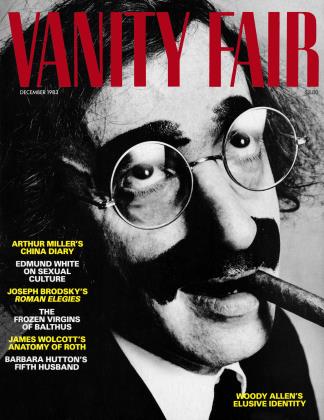Sign In to Your Account
Subscribers have complete access to the archive.
Sign In Not a Subscriber?Join NowMOVIES
THUMBS UP THUMBS DOWN
The liveliest Arts This Month: Previews, Reviews, and Overviews
THE DRESSER, directed by Peter Yates (Columbia). The Dresser has been stuffed so full of acting that the screen fairly bulges. How, one wonders, can such modest sets contain all these tics and grimaces, all these bellows and stage whispers, all these mincings and prancings and manful strides? Peter Yates’s adaptation of the overwrought Ronald Harwood stage hit is a banquet of hamminess, but then hamminess is very much to the point. This is, after all, the maudlin record of a famous Shakespearean actor (Albert Finnev) in his final days, and of the lifelong offstage performance his adoring dresser (Tom Courtenay) contrives to preserve the great man’s sanity. Yates, a director better known for car chases and bicycle races, lets his camera bounce off the dressing-room walls like a caged hyena, and this doesn’t do much to tone down Tom Courtenay, whose performance is all lavender-tinted prissiness—it’s The Boys in the Band style gay-face. Albert Finney has never been more orotund, yet his performance really works. Venting his lines in a voice that spans a spectrum of fogs and moans, he somehow transcends overacting. When his character plays Lear, for instance, we realize Finney’s giving a performance that would be ghastly on a stage, and yet, seen through The Dresser's narrative veils, it turns into something grand and admirable: a summation of all the raging, croaking Lears that ever were, and of the actors who portrayed them. The Dresser was never much of a play, and it isn’t much of a movie, but Finney’s performance is very special. He makes you see how an actor’s talent and his madness can amount to the same thing.
HEART LIKE A WHEEL, directed by Jonathan Kaplan (20th Century—Fox). Under Kaplan's hustling direction, this is not so much a racing picture as a buoyant, spirited hymn to American grit and self-reliance. The story of drag-race champion Shirley Muldowney (Bonnie Bedelia), Heart Like a Wheel veers crazily from the conventional to the visionary, but Bedelia gives a soulful, sexy performance that's richly aware of Muldowney's hardness and will, and of the toll her resolve has taken. It may be the best work by an actress in an American film this year.
—S.S.
STEPHEN SCHIFF
LIFE IS A BED OF ROSES, directed by Alain Resnais (International Spectrafilm). In this carefully fractured fairy tale, Alain Resnais mistakes curdled whimsy for comedy and mass mooing for music. It's a big jujube of a movie: gooey and thick and terribly eager to seem fresh...
BOAT PEOPLE, directed by Ann Hui (International Spectrafilm). Condensing stories told her by refugees from the new, even more barbaric Vietnam, the Hong Kong filmmaker Ann Hui has created a naive but undeniably wrenching piece of art brut. The danger, of course, is that audiences will take this jam-packed parade of horrors as a fair portrait of daily life in Commieland. And though Vietnam must have more than its share of quotidian grimness. Boat People serves it all up with an extra dollop of sensationalism—each new atrocity seems calculated to top the last. It's an art-house film, but it wouldn’t look out of place on a Times Square double bill with / Eat Your Lungs. . . —S.S.
YENTL, directed by Barbra Streisand (MGM/UA). There’s a new brand of nostalgia in the air, a poignant longing for the early-twentiethcentury Jewish culture that assimilation swallowed up. You can feel it in movies like Zelig and Daniel, and in the revived interest in Yiddish movies and plays. And you can feel it in every frame of Barbra Streisand’s touching, surprisingly tender new musical, Yentl. Based on an Isaac Bashevis Singer story, Yentl is about a rabbi’s daughter (Streisand) who disguises herself as a boy so she can become a scholar (a pursuit forbidden to women) and then falls in love with her burly, bearded study partner (Mandy Patinkin). This could have been a sex farce with yarmulkes, but Streisand has filled it to bursting with the old Jewish values: reverence for elders, the worship of books, and the sanctity of love. It’s a fervently traditional movie, and it tugs at the emotions in traditional ways that expose our own jadedness; we keep expecting a hint of meanness in the heroes, or at least a glimmer of kinkiness in their sexual confusion. Instead, Yentl is a ruddy-cheeked fairy tale. The sun is always shining on the picturesque Czech countryside, and Streisand’s mama’sboy act is always charming—it never has the glittering hardness her acting took on around the time of A Star Is Born. She can direct too; she knows just where to close in on a face for drama, where to back off to get a laugh. Being Barbra, she also does the singing, but the songs are the movie’s big mistake. They’re dreary and witless, and they keep telling us what we already know. Streisand has made a sweetly intimate fantasy; it doesn’t need all this Michel LegranAeur.
—S.S.
 View Full Issue
View Full Issue






Subscribers have complete access to the archive.
Sign In Not a Subscriber?Join Now